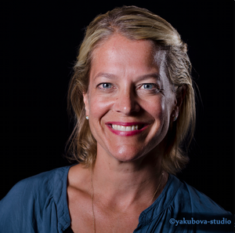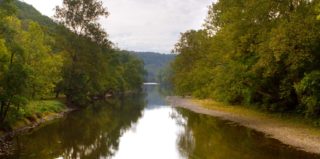Bethany Wiggin joined the faculty at Penn in 2003 and is an Associate Professor of German and affiliated faculty in the Program in Comparative Literature and the Department of English. She received her B.A. with Distinction in German and in Economics from Swarthmore College and her Ph.D. from the University of Minnesota.
Her books and essays explore histories of migration, language, multilingualism, and cultural translation since the Columbian exchange across the Atlantic world. Her current book project--Utopia Found, Lost, and Re-Imagined in Penn’s Woods--considers the uses and abuses of history in the longue duree. Inspired by a conversation between Bloch and Adorno on the best sentence Brecht ever wrote (and only two words long, "etwas fehlt"), the book offers a series of six object biographies. Things can be good to think with, and the selected objects, from three historical periods (colonial, 19th century to 1861, and contemporary), prompt meditations on utopian philosophies and practices in a time of rapid climate change. She is the author of Novel Translations: The European Novel and the German Book, 1680-1730, an exploration of the development of reading as entertainment, the transnational invention of fashion, and the commodification of the book. She is co-editor of Un/Translatables: New Maps for Germanic Cultures, and editor of Babel of the Atlantic: Empire and the Language Question in the Colonial Mid-Atlantic. She has co-edited a special section of the German Studies Review on The Rise and Fall--or Fall and Rise?--of Monolingualism and is presently co-editing (with Carolyn Fornoff and Patricia Kim) Timescales: Ecological Temporalities across Disiplines. A collaborative volume, A Field Guide to Teaching On Water, is now in preparation.
For German majors she regularly directs senior thesis projects and teaches courses, including "Translits," a core course, as well as a variety of topic courses. In English, she teaches "Censored!: A History of Book Censorship" and "Sustainabilty and Utopianism." Recent graduate seminars include "Environmental Humanities: Theory, Method, Practice;" "Theory and Practice of the Novel," "Early Modern Cultural Translation," and "Utopian Experiments." She is the co-PI of the interdisciplinary Making A Difference project on Rising Waters, and in the summer of 2018, she will co-teach the first On-Water Summer Intensive in Philadelphia. In the fall semester of 2018, ahead of the Winter Intensive in Mumbai, she will teach "Liquid Histories and Floating Archives," a class for undergraduates about water, climate change, and the changing shape of historical memory in post-colonial port cities in four continents.
Her work aims to connect with audiences beyond the academy and has been featured on (selections) the PBS Newshour, CBS Evening News, CNN, The Daily Show with Trevor Noah, Vice, Die Tagesschau, The Washington Post, The New York Times, Die Süddeutsche Zeitung, Le Monde, and Science Friday.
In 2014, she and her students co-founded the Penn Program in Environmental Humanities (ppehlab.org). She now directs PPEH at a moment of rapid programmatic growth. In June 2017, the Andrew W. Mellon Foundation awarded PPEH a $1.5 million to develop its core commitments to
- -broadly interdisciplinary research and teaching across the arts and sciences
- -place-based inquiry exploring Philadelphia's urban environment
- -work with artists
- -urgent collecting and the co-creation of living archives
Since 2016, she co-organizes the Schuylkill River and Urban Waters Corps, an informal collective of academic, non-profit, civic and community organizations. Based in Philadelphia, The SRUWC is devoted to exploring and stewarding urban waters past and present. The Corps is currently fostering collaborations in other cities, and we are building a digital archive for our members' varied work: contributing, collecting, and curating oral histories; developing a variety of tours, both on-line and in-person; measuring air and water quality; and designing and building an array of citizen science and public humanities projects to discover and document the waters--and invite considerations of how they will exist in the future.
In November 2016, she co-founded the collaborative public archiving project, Data Refuge. It drew attention to how climate denial endangers federal environmental data. With the help of thousands of civic partners and volunteers, the project has rapidly spread to over fifty cities and towns across the country. Now, with support from the National Geographic Foundation, Data Refuge is building a storybank to document how data lives in the world – and how it connects people, places, and non-human species. Visit datarefuge.org to learn more about the project.
In 2016-17, she was a Whiting Public Engagement Fellows. In December 2017, the Union of Concerned Scientists honored her with their Science Defender award.

